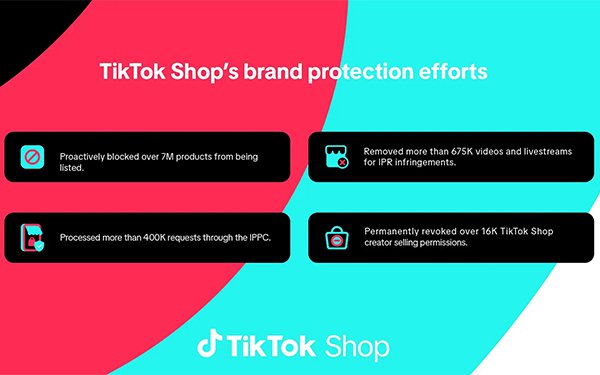The Ins And Outs Of Brand IP Security, According To TikTok Shop
- by Colin Kirkland , May 5, 2025

In an attempt to dispel possible brand concerns over their intellectual property being illegally stolen on its ecommerce platform, TikTok has released a report highlighting precautions the company has taken to protect brand IP and provide reliable product listings across various regions.
At the start of TikTok Shop’s third “Safety Report,” the ByteDance-owned digital shopping platform says that it has spent nearly $1 billion in tools, technologies and people to help protect customers, sellers and brands from “counterfeit activities, fraudulent behavior, and other instances of abuse.”
To screen potential sellers, TikTok says it asks for documentation to verify their identities, business type and eligibility to operate the business in question.
advertisement
advertisement
Following approval, the company places new sellers on “a temporary probation” in which their number of daily orders and product uploads are limited.
According to the report, TikTok Shop declined 1.6 million seller account registrations between July and December last year. During this time, TikTok also rejected over 50 million product listing attempts that did not meet the company’s registration or listing requirements.
“As we have expanded to new markets, it is normal to see a rise in listing rejections as more individuals and businesses are selling on TikTok Shop, in addition to our increased investment in detection technology,” the report reads.
As for policy violations, the company says it will remove products, deactivate accounts or suspend available ecommerce features.
Between July and December 2024, TikTok Shop removed over 90,000 restricted or prohibited products after listing, while also removing ecommerce features from more than 700,000 creators, and removed over 450,000 sellers entirely due to “shop closures caused by shop-level violations.”
As for brand partnerships, TikTok Shop requires third-party sellers to provide a letter of authorization from the brand owner or authorized resellers. If they fail to meet verification requirements, their store is deactivated.
The platform accepted over 85,000 brand authorizations from shops on the platform in that six-month period, and over 75,000 penalties for missing brand authorization were applied -- “significantly fewer” compared to the prior six-month period, between January and June 2024.
By using algorithms and machine-learning tech based on information provided by customers and brand owners, TikTok Shop says it prevented more than 7.5 million products from being listed for IP violations.
Over 450,000 products were detected after being listed, and more than 16,000 sellers had their permission to sell permanently revoked due to IP violations.
Finally, TikTok Shop says it stopped over 125,000 livestreams and 550,000 short-form videos due to IP infringement concerns.


